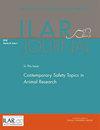为什么IACUCs需要伦理学家?
IF 3.1
3区 农林科学
Q1 VETERINARY SCIENCES
引用次数: 3
摘要
有些动物研究在道德上是错误的,有些动物研究在道德上是不好的,但可以改进。谁最有可能识别出错误或糟糕的动物研究并倡导改进?我认为,哲学伦理学家拥有的专业知识使他们可能是这些任务的最佳候选人。我回顾了哲学伦理学家往往拥有的技能、知识和观点,这些使他们成为道德专家。我认为,只要机构动物保护和使用委员会被期望确保研究是合乎道德的,他们就必须有哲学伦理学家作为成员。本文章由计算机程序翻译,如有差异,请以英文原文为准。
Why IACUCs Need Ethicists.
Some animal research is arguably morally wrong, and some animal research is morally bad but could be improved. Who is most likely to be able to identify wrong or bad animal research and advocate for improvements? I argue that philosophical ethicists have the expertise that makes them the likely best candidates for these tasks. I review the skills, knowledge, and perspectives that philosophical ethicists tend to have that makes them ethical experts. I argue that, insofar as Institutional Animal Care and Use Committees are expected to ensure that research is ethical, they must have philosophical ethicists as members.
求助全文
通过发布文献求助,成功后即可免费获取论文全文。
去求助
来源期刊

Ilar Journal
农林科学-兽医学
CiteScore
5.10
自引率
20.00%
发文量
8
审稿时长
>18 weeks
期刊介绍:
The ILAR Journal is the peer-reviewed, theme-oriented publication of the Institute for Laboratory Animal Research (ILAR), which provides timely information for all who study, use, care for, and oversee the use of animals in research. The journal publishes original articles that review research on animals either as direct subjects or as surrogates for humans. According to policy, any previously unpublished animal research reported in the ILAR Journal will have been conducted according to the scientific, technical, and humanely appropriate guidelines current at the time the research was conducted in accordance with the Guide for the Care and Use of Laboratory Animals or other guidance provided by taxonomically-oriented professional societies (e.g., American Society of Mammalogy) as referenced in the Guide.
 求助内容:
求助内容: 应助结果提醒方式:
应助结果提醒方式:


